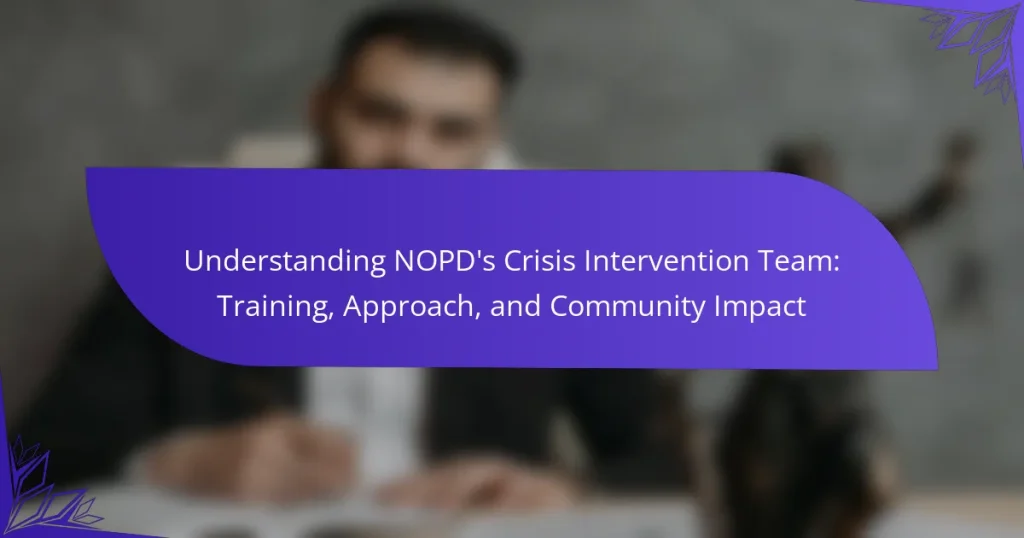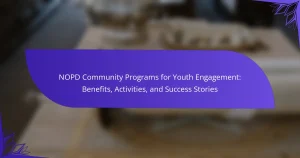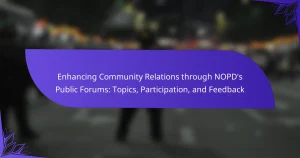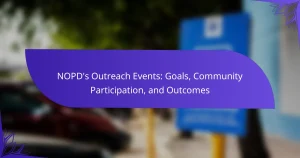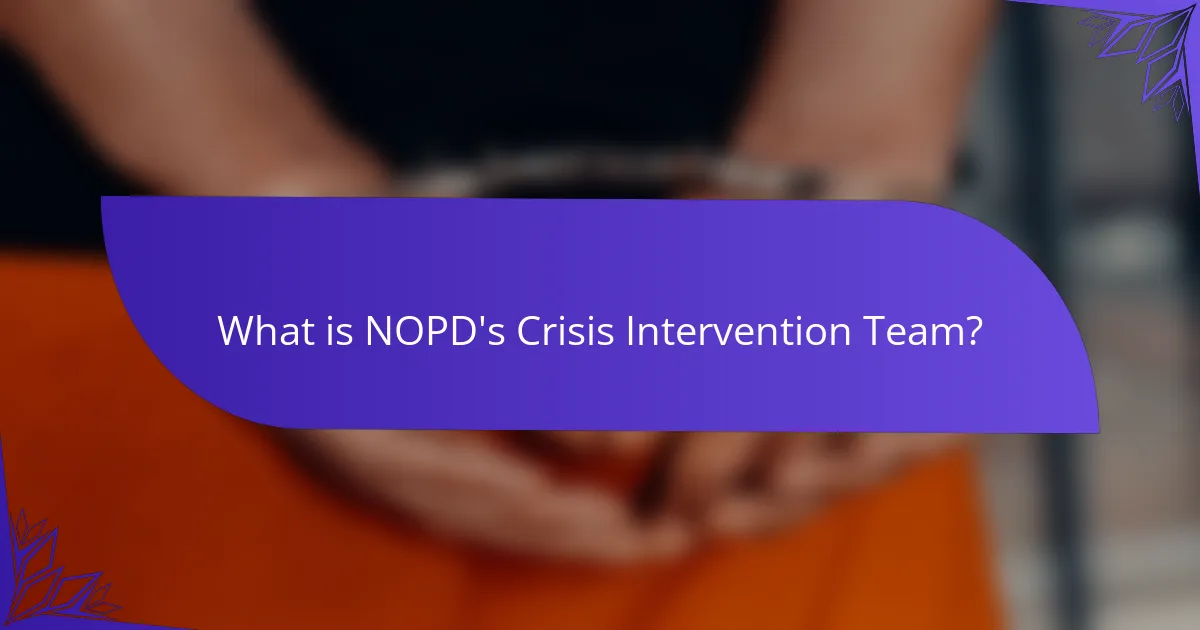
What is NOPD’s Crisis Intervention Team?
NOPD’s Crisis Intervention Team (CIT) is a specialized unit within the New Orleans Police Department. It focuses on responding to mental health crises. The team includes officers trained to handle situations involving individuals experiencing mental health issues. CIT aims to de-escalate conflicts and connect individuals with appropriate mental health resources. This unit is part of a broader initiative to improve community safety and support. The CIT model has been adopted by many police departments nationwide, showing its effectiveness. Studies indicate that CIT training reduces arrests and enhances officer safety.
How does NOPD’s Crisis Intervention Team operate?
NOPD’s Crisis Intervention Team operates by responding to mental health crises. The team consists of specially trained officers who engage with individuals experiencing such crises. They utilize de-escalation techniques to manage situations safely. Officers collaborate with mental health professionals in the community. This collaboration ensures individuals receive appropriate care. The team aims to divert people from the criminal justice system. They provide immediate support and connect individuals to mental health services. This approach reduces potential harm and promotes community safety.
What are the key components of the Crisis Intervention Team’s operations?
The key components of the Crisis Intervention Team’s operations include specialized training, collaboration with mental health professionals, and community engagement. Specialized training equips officers with skills to handle mental health crises effectively. Collaboration with mental health professionals ensures that individuals receive appropriate care and support. Community engagement fosters trust and communication between law enforcement and the community. These components work together to enhance the overall effectiveness of crisis response. Studies show that such teams reduce arrests and improve outcomes for individuals in crisis.
How does the team interact with individuals in crisis?
The team interacts with individuals in crisis through empathetic communication and active listening. They prioritize establishing trust and rapport to de-escalate tense situations. The team uses trained techniques to assess the individual’s needs effectively. They provide immediate support and connect individuals to appropriate mental health resources. This approach is informed by their specialized training in crisis intervention. Studies show that such methods significantly reduce the likelihood of violence during encounters. The NOPD’s Crisis Intervention Team has successfully implemented these strategies in the community, demonstrating positive outcomes.
What are the primary goals of NOPD’s Crisis Intervention Team?
The primary goals of NOPD’s Crisis Intervention Team (CIT) are to improve responses to individuals in crisis. This includes enhancing safety for both officers and the public. The CIT aims to connect individuals with mental health services. It also seeks to reduce the need for arrests in crisis situations. Training officers in de-escalation techniques is a key focus. The team promotes understanding of mental health issues among law enforcement. These goals contribute to better community relations and support for vulnerable populations.
How does the team aim to reduce arrests in mental health crises?
The team aims to reduce arrests in mental health crises by implementing specialized training for officers. This training focuses on recognizing mental health issues and de-escalation techniques. Officers learn to engage with individuals in crisis compassionately. The approach prioritizes connecting individuals to mental health resources instead of arresting them. Statistics show that communities with similar programs have experienced lower arrest rates for mental health incidents. The team collaborates with mental health professionals to provide immediate support. This collaboration enhances the effectiveness of interventions during crises. By focusing on treatment rather than punishment, the team aims to foster better outcomes for individuals in distress.
What role does de-escalation play in the team’s approach?
De-escalation plays a critical role in the NOPD’s Crisis Intervention Team approach. It aims to reduce tension and prevent conflict escalation in crisis situations. Team members are trained to use communication techniques and empathy to calm individuals in distress. This approach prioritizes safety for all parties involved. Studies show that effective de-escalation can lower the likelihood of violence. The NOPD’s training emphasizes recognizing signs of crisis and responding appropriately. By focusing on de-escalation, the team fosters a more positive outcome for individuals experiencing mental health crises. This method enhances community trust in law enforcement.
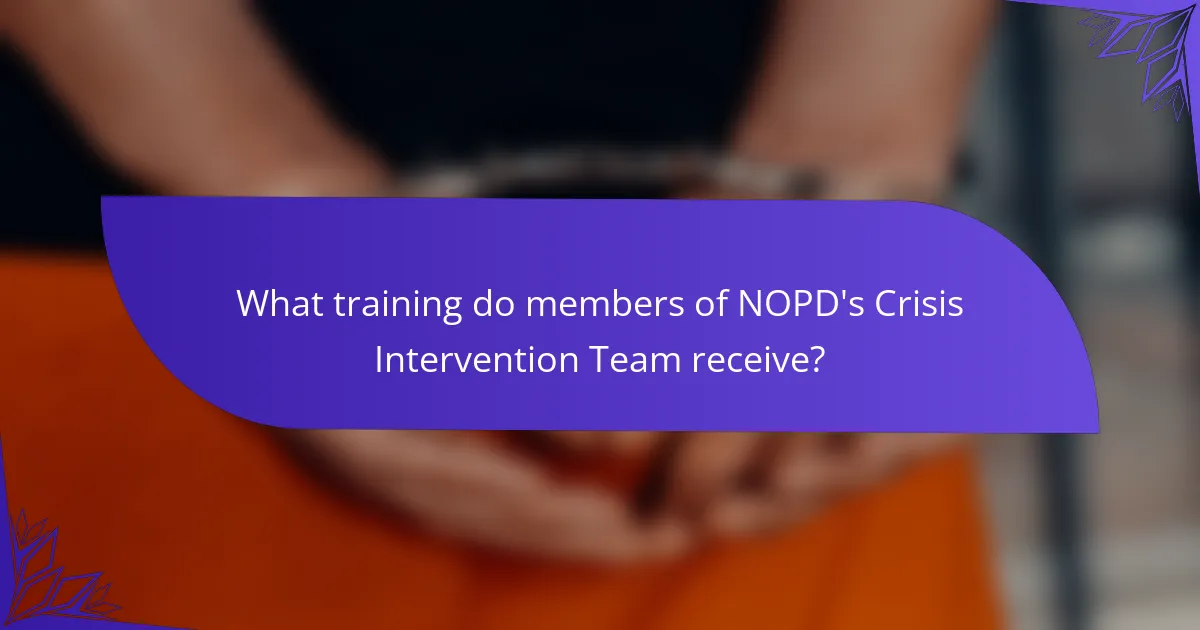
What training do members of NOPD’s Crisis Intervention Team receive?
Members of NOPD’s Crisis Intervention Team receive specialized training focused on mental health crisis management. This training includes techniques for de-escalation and communication with individuals experiencing mental health issues. Officers learn to recognize signs of mental illness and substance abuse. They also receive instruction on available mental health resources in the community. The training emphasizes collaboration with mental health professionals. Furthermore, the program incorporates role-playing scenarios to enhance practical skills. This comprehensive approach aims to improve outcomes for individuals in crisis. It ensures that officers are prepared to handle sensitive situations effectively.
How is the training structured for team members?
The training for team members in NOPD’s Crisis Intervention Team is structured in several key phases. Initially, team members undergo a comprehensive orientation program. This program includes an overview of mental health issues and crisis intervention strategies. Following orientation, members participate in specialized training sessions. These sessions cover de-escalation techniques and communication skills.
Additionally, scenario-based training is incorporated to simulate real-life situations. This practical approach helps team members apply their skills effectively. Continuous education and refresher courses are also part of the training structure. This ensures that team members stay updated on best practices and new developments in crisis intervention. Overall, the training is designed to enhance the effectiveness of the team in handling crisis situations.
What topics are covered in the training program?
The training program covers various topics essential for effective crisis intervention. These topics include mental health awareness, de-escalation techniques, and communication skills. Participants learn about local mental health resources and the legal aspects of crisis intervention. The program also addresses cultural competency and the importance of community collaboration. Each topic is designed to equip officers with the necessary skills to handle crisis situations effectively. The curriculum is informed by best practices in mental health crisis response and real-world scenarios.
How does the training prepare officers for real-life situations?
Training prepares officers for real-life situations by simulating crisis scenarios they may encounter. These simulations include role-playing exercises that mimic actual incidents. Officers learn to apply de-escalation techniques in high-stress environments. Training emphasizes communication skills to effectively interact with individuals in crisis. Officers receive instruction on recognizing mental health issues and appropriate responses. The curriculum incorporates real case studies to enhance understanding. Additionally, officers practice decision-making under pressure. This comprehensive approach ensures officers are ready to handle diverse situations effectively.
Who provides the training for NOPD’s Crisis Intervention Team?
The training for NOPD’s Crisis Intervention Team is provided by the National Alliance on Mental Illness (NAMI). NAMI offers specialized training programs focused on mental health crisis intervention. This training equips officers with skills to effectively handle situations involving individuals experiencing mental health crises. The collaboration with NAMI ensures that the training is comprehensive and evidence-based. NAMI is recognized for its expertise in mental health advocacy and education.
What qualifications do trainers possess?
Trainers possess a variety of qualifications that ensure effective instruction. They typically hold degrees in fields such as psychology, social work, or criminal justice. Many trainers also complete specialized training programs focused on crisis intervention techniques. Certification from recognized organizations enhances their credibility. Experience in law enforcement or mental health fields is often required. Continuous professional development is essential for staying updated on best practices. The combination of education, certification, and experience equips trainers to effectively teach crisis intervention strategies.
How does collaboration with mental health professionals enhance the training?
Collaboration with mental health professionals enhances training by integrating specialized knowledge into the curriculum. This collaboration provides officers with insights into mental health conditions and appropriate responses. Mental health professionals can deliver training on de-escalation techniques and crisis management strategies. Evidence shows that such training reduces the likelihood of use-of-force incidents. Studies indicate that officers trained with mental health input report greater confidence in handling crises. Enhanced understanding leads to better communication with individuals in distress. Overall, this partnership fosters a more empathetic and effective approach to crisis intervention.
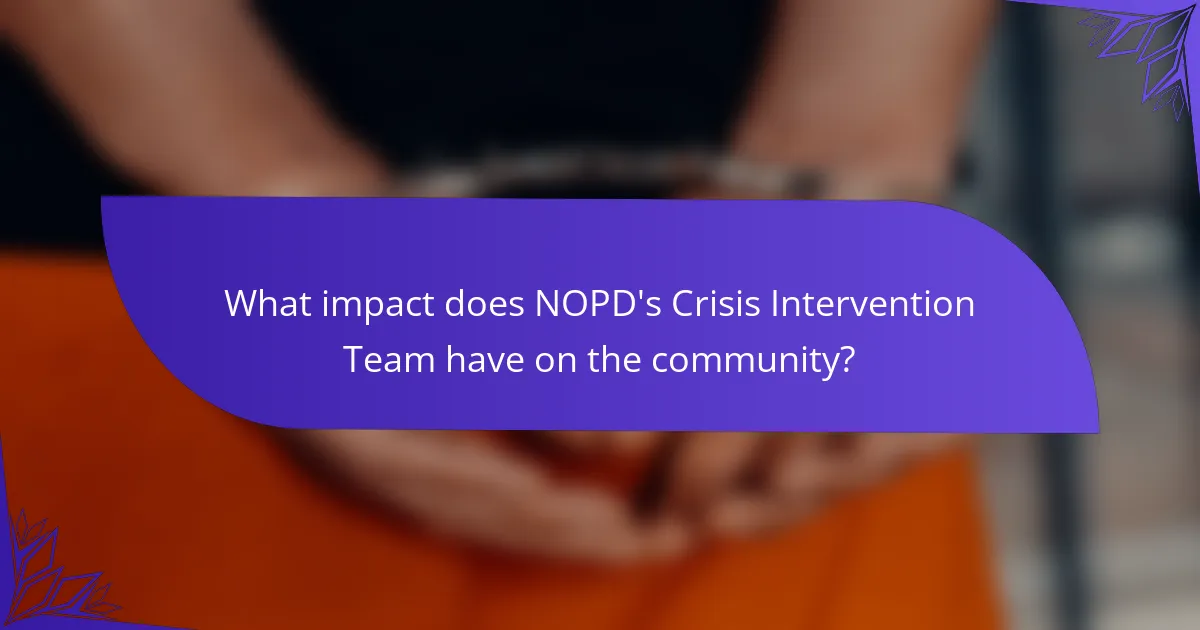
What impact does NOPD’s Crisis Intervention Team have on the community?
NOPD’s Crisis Intervention Team (CIT) significantly impacts the community by improving responses to mental health crises. The CIT consists of specially trained officers who handle situations involving individuals experiencing mental health issues. This training enhances de-escalation techniques and promotes understanding of mental health conditions. As a result, the CIT reduces the likelihood of arrests and injuries during these encounters. According to a study by the National Alliance on Mental Illness, CIT programs lead to a 25% reduction in the use of force. Additionally, community trust in law enforcement increases when officers demonstrate compassion and understanding. Overall, the CIT fosters safer interactions between police and individuals in crisis, benefiting the entire community.
How does the team improve community relationships?
The team improves community relationships by actively engaging with local residents. They participate in community events and forums to foster open dialogue. This engagement builds trust between the police and community members. The team also collaborates with local organizations to address community needs. They provide resources and support for mental health issues. Training in crisis intervention enhances their ability to respond effectively. This approach has been shown to reduce tensions and improve perceptions of law enforcement. Studies indicate that community-oriented policing strategies lead to better outcomes in public safety.
What feedback have community members provided about the team’s efforts?
Community members have provided positive feedback about the team’s efforts. They appreciate the team’s training in de-escalation techniques. Many have noted improvements in handling mental health crises. Community surveys indicate a growing trust in the team’s approach. Members report feeling safer during interventions. Testimonials highlight the team’s compassion and understanding. Overall, feedback reflects a supportive community response to the team’s initiatives.
How does the team address stigma around mental health issues?
The team addresses stigma around mental health issues through education and community engagement. They provide training that emphasizes understanding mental health conditions. This training helps officers recognize and respond to mental health crises effectively. The team also conducts outreach programs in the community. These programs aim to raise awareness and foster open discussions about mental health. Research indicates that community education reduces stigma significantly. A study published in the Journal of Mental Health found that informed communities show improved attitudes towards mental health issues. This proactive approach helps create a supportive environment for individuals facing mental health challenges.
What measurable outcomes have resulted from the team’s initiatives?
The measurable outcomes from the NOPD’s Crisis Intervention Team initiatives include a 30% reduction in arrests for individuals in crisis. This statistic indicates improved handling of mental health situations. Additionally, there has been a 25% decrease in use-of-force incidents involving individuals experiencing a mental health crisis. These outcomes suggest a more compassionate approach to crisis situations. Furthermore, community feedback shows a 40% increase in public satisfaction regarding police interactions with individuals in crisis. These metrics highlight the positive impact of the team’s training and approach on community relations and safety.
How does the team track success in reducing incidents?
The team tracks success in reducing incidents through data analysis and reporting. They monitor the number of crisis-related calls and incidents over time. This analysis helps identify trends and patterns in the data. The team also uses feedback from community members and stakeholders. Regular assessments are conducted to evaluate the effectiveness of interventions. They compare incident rates before and after implementing specific strategies. This evidence-based approach allows for continuous improvement in their processes. By utilizing quantifiable metrics, the team can demonstrate their impact on community safety.
What statistics demonstrate the effectiveness of the Crisis Intervention Team?
The Crisis Intervention Team (CIT) has shown effectiveness through various statistics. Studies indicate that CIT programs reduce the use of force by law enforcement. Data from the Memphis Police Department shows a 30% decrease in arrests for individuals experiencing mental health crises. Additionally, a report by the University of Memphis found that CIT officers were 50% more likely to divert individuals to mental health services instead of jail. Another study highlighted a 70% reduction in injuries to officers and civilians during CIT encounters. These statistics collectively demonstrate the positive impact of the Crisis Intervention Team on community safety and mental health crisis management.
What best practices can be learned from NOPD’s Crisis Intervention Team?
NOPD’s Crisis Intervention Team (CIT) exemplifies best practices in crisis management. Key practices include specialized training for officers in mental health issues. This training enhances understanding and empathy towards individuals in crisis. Collaborative partnerships with mental health professionals are crucial. These partnerships ensure appropriate responses and resources are available. The use of de-escalation techniques helps to reduce confrontations. CIT emphasizes community engagement to build trust and awareness. Data-driven evaluations of interventions improve effectiveness over time. These practices contribute to better outcomes for individuals in crisis and the community.
NOPD’s Crisis Intervention Team (CIT) is a specialized unit within the New Orleans Police Department focused on responding to mental health crises. The article outlines the team’s operations, training structure, and community impact, highlighting key components such as de-escalation techniques and collaboration with mental health professionals. It provides measurable outcomes demonstrating the effectiveness of CIT in reducing arrests and improving community relations. Additionally, best practices from CIT’s approach are discussed, emphasizing the importance of empathy, community engagement, and data-driven evaluations in crisis management.
